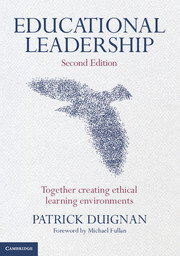Book contents
- Frontmatter
- Foreword
- Contents
- Acknowledgements
- INTRODUCTION AND OVERVIEW
- CHAPTER 1 THE CHANGING AND CHALLENGING CONTEXT FOR EDUCATIONAL LEADERS
- CHAPTER 2 KEY MACRO CHALLENGES FOR EDUCATIONAL LEADERS
- CHAPTER 3 KEY MICRO CHALLENGES FOR EDUCATIONAL LEADERS
- CHAPTER 4 LEADERSHIP CHALLENGES AS TENSIONS
- CHAPTER 5 A FRAMEWORK FOR ANALYSING ETHICAL TENSIONS
- CHAPTER 6 VISION-INSPIRED LEADERSHIP AND ETHICAL DECISION-MAKING
- CHAPTER 7 BUILDING A COLLECTIVE ETHIC OF RESPONSIBILITY FOR LEADERSHIP IN SCHOOLS
- CHAPTER 8 AUTHENTIC LEADERS USE THE POWER OF PRESENCE, AUTHENTIC RELATIONSHIPS, AND INFLUENCE FIELDS
- CHAPTER 9 AUTHENTIC LEADERS HELP CREATE INNOVATING, DEEP, RICH LEARNING ENVIRONMENTS
- CHAPTER 10 FORMING CAPABLE AND AUTHENTIC LEADERS: TRANSFORMATIONAL LEARNING APPROACHES
- References
- Index
CHAPTER 4 - LEADERSHIP CHALLENGES AS TENSIONS
Published online by Cambridge University Press: 05 June 2012
- Frontmatter
- Foreword
- Contents
- Acknowledgements
- INTRODUCTION AND OVERVIEW
- CHAPTER 1 THE CHANGING AND CHALLENGING CONTEXT FOR EDUCATIONAL LEADERS
- CHAPTER 2 KEY MACRO CHALLENGES FOR EDUCATIONAL LEADERS
- CHAPTER 3 KEY MICRO CHALLENGES FOR EDUCATIONAL LEADERS
- CHAPTER 4 LEADERSHIP CHALLENGES AS TENSIONS
- CHAPTER 5 A FRAMEWORK FOR ANALYSING ETHICAL TENSIONS
- CHAPTER 6 VISION-INSPIRED LEADERSHIP AND ETHICAL DECISION-MAKING
- CHAPTER 7 BUILDING A COLLECTIVE ETHIC OF RESPONSIBILITY FOR LEADERSHIP IN SCHOOLS
- CHAPTER 8 AUTHENTIC LEADERS USE THE POWER OF PRESENCE, AUTHENTIC RELATIONSHIPS, AND INFLUENCE FIELDS
- CHAPTER 9 AUTHENTIC LEADERS HELP CREATE INNOVATING, DEEP, RICH LEARNING ENVIRONMENTS
- CHAPTER 10 FORMING CAPABLE AND AUTHENTIC LEADERS: TRANSFORMATIONAL LEARNING APPROACHES
- References
- Index
Summary
Many of the major challenges facing educational leaders involve situations where values and ethics are contested. Some of these challenges constitute what may be called ‘contesta ble values dualities’, or ‘ethical dilemmas’ (Dempster & Berry, 2003; Dempster, 2001 ; Wildy et al., 2001)). There seems to be agreement that ‘the whole field of ethics is a contested terrain’ (Cranston et al., 2006, p. 108) and for educational leaders it may often feel like they are ‘blindfolded in a minefield’ (Dempster & Berry, 2003, p. 457).
Frequently, we tend to think of dilemmas as ‘ethical dilemmas’ because they identify difficult and challenging situations ‘in which a choice has to be made between two equally undesirable alternatives’ (Australian Pocket Oxford Dictionary, 2007, p. 294); hence the saying, ‘on the horns of a dilemma’. However, the majority of the challenges discussed in this chapter represent situations where there are more than two alternative possibilities; in fact most of the challenges are multidimensional in nature. In this book, the word ‘tension’ is preferred to ‘dilemma’ to describe these situations, because it denotes that relationships exist between a number of contestable values dualities (a dilemma with multiple horns) and that different possible solutions for each situation will reflect how these relationships are mediated. This perspective has profound implications for how educational leaders respond to difficult and challenging situations.
- Type
- Chapter
- Information
- Educational LeadershipTogether Creating Ethical Learning Environments, pp. 58 - 75Publisher: Cambridge University PressPrint publication year: 2012



